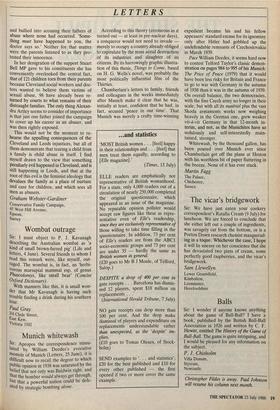Munich whitewash
Sir: Apropos the correspondence stimu- lated by William Deedes's evocative memoir of Munich (Letters, 25 June), it is difficult now to recall the degree to which Public opinion in 1938 was saturated by the belief that not only was Baldwin right, and that the bomber would always get through, but that a powerful nation could be defe- ated by strategic bombing alone. According to this theory (erroneous as it turned out — at least in pre-nuclear days), a conqueror would not need to invade merely to occupy a country already obliged to capitulate by the mass aerial destruction of its industries and slaughter of its citizens. By its harrowingly graphic illustra- tion of this thesis, Things to Come, based on H. G. Wells's novel, was probably the most politically influential film of the Thirties.
Chamberlain's letters to family, friends and colleagues in the weeks immediately after Munich make it clear that he was, initially at least, confident that he had, in fact, secured 'peace in our time'. That Munich was merely a crafty time-winning expedient became his and his fellow appeasers' standard excuse for its ignominy only after Hitler had gobbled up the undefendable remnants of Czechoslovakia in March 1939.
Pace William Deedes, it seems hard now to contest Telford Taylor's classic demon- stration on pages 984 to 995 of his Munich: The Price of Peace (1979) that it would have been less risky for Britain and France to go to war with Germany in the autumn of 1938 than it was in the autumn of 1939. On overall balance, the two democracies, with the fine Czech army no longer in their scale, but with all its materiel plus the vast Skoda armaments works now weighing heavily in the German one, grew weaker vis-à-vis Germany in that 12-month in- terim, and not, as the Munichites have so sedulously and self-interestedly main- tained, stronger.
Whitewash, by the thousand gallon, has been poured over Munich ever since Chamberlain got off the plane at Heston with his worthless bit of paper fluttering in the breeze. None of it has ever stuck.
Martin Fagg
The Palace, Chichester, Sussex.














































 Previous page
Previous page